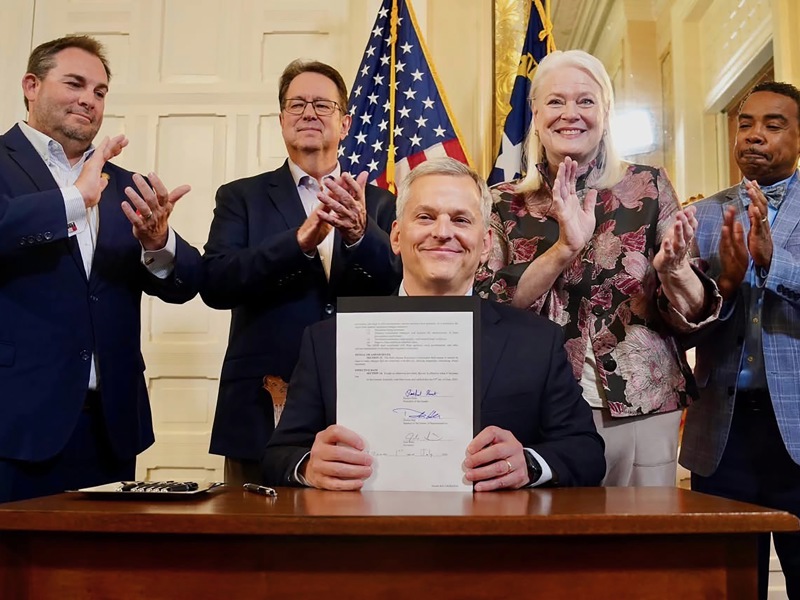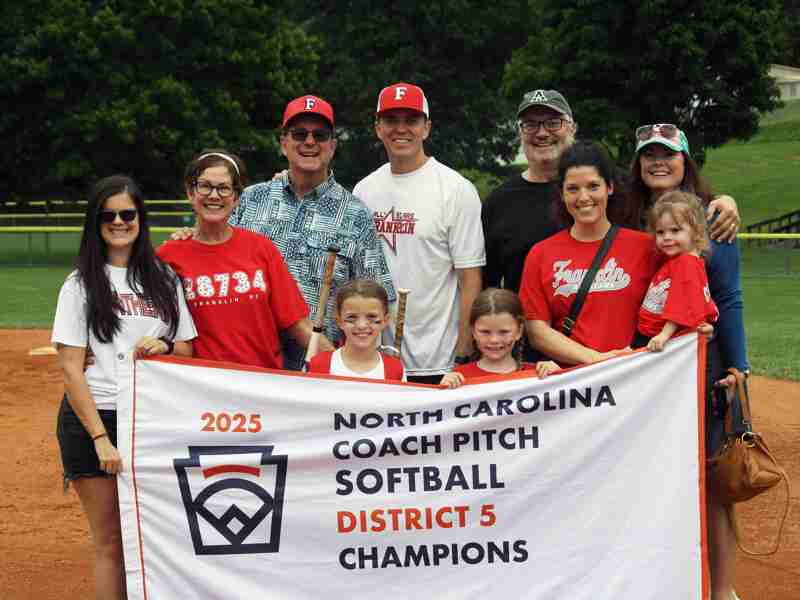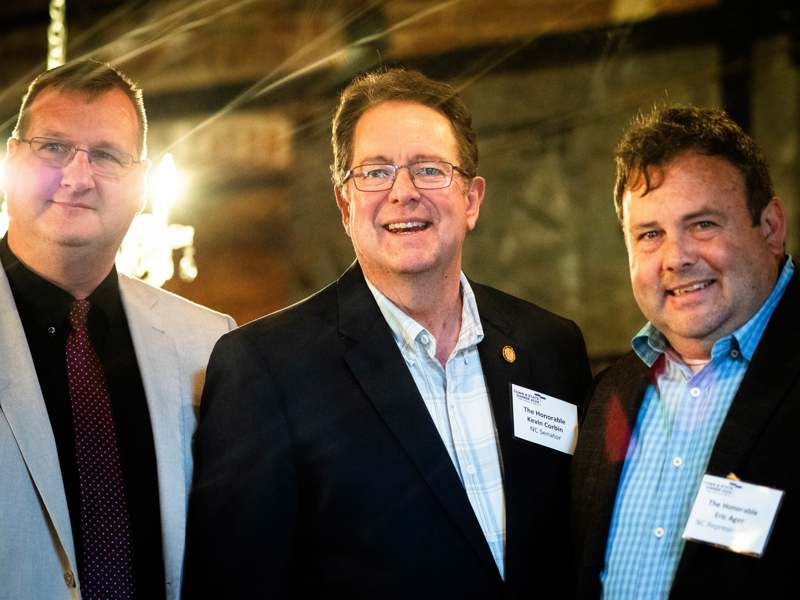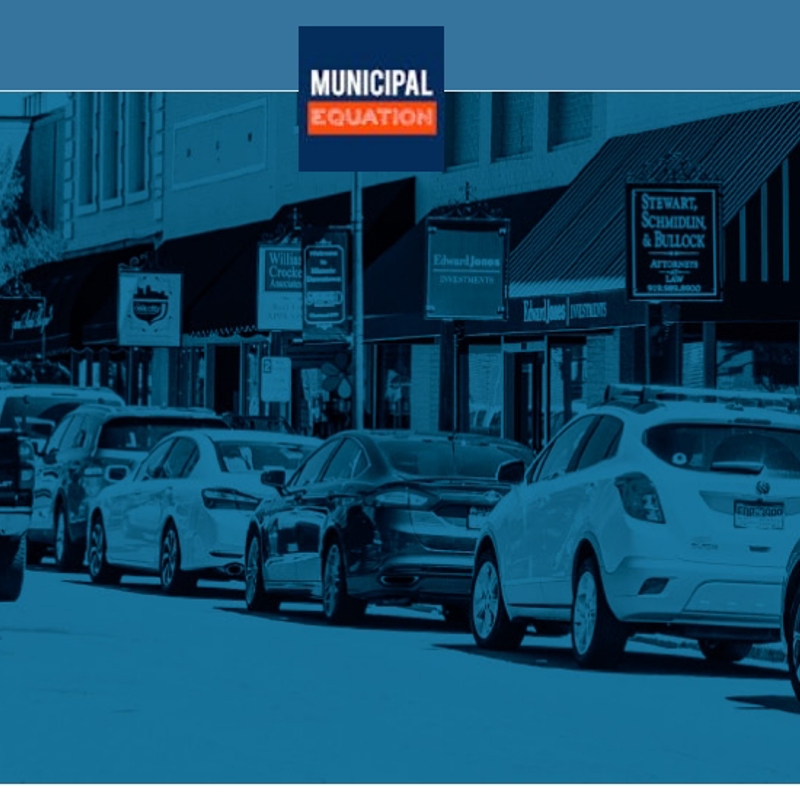Keeping It Local: Senator Kevin Corbin
Q3 2025 | Vol. 75, Issue 3
Senn. Kevin Corbin is nearly 10 years into state-level service in the N.C. General Assembly, following his election to the House in 2016 and to the Senate in 2020, where he’s worked with fellow lawmakers on all manner of topics, from perennial to developing to urgent. Coming from the Macon County seat of Franklin, in the state’s “far west” tip, it’s quite a haul to the Legislative Building in Raleigh—more than 300 miles, one way. But the distance and time away don’t obscure his local roots at all, nor does his elected state role blur where it all began for him. Sen. Corbin is a local government guy at heart, having started out on the county school board when he was 22. He stayed on for 20 years, mostly as chairman, before moving to the county’s board of commissioners, also later as chairman. He said he sees that experience as important to his legislative work and holds an appreciation of how it all comes together. Southern City caught up with Sen. Corbin recently at his home in Franklin (where he lives with his wife Beth and is happy to have his grown kids, Matt and Maggie, as close neighbors) to learn more about his motivation to serve.
~~~
Tell us about your district. What lights you up when people ask about home?
KC: Everybody will tell you I'm very proud of where I'm from. My district is pretty much everything west of Asheville. It’s eight western counties (Cherokee, Clay, Graham, Haywood, Jackson, Macon, Swain and Transylvania). It includes the Great Smoky Mountains National Park, and it includes the Eastern Band of the Cherokee Indians. I'm very proud of our mountain heritage. My family's from here. We settled in the Franklin area about 1830, and the property that I live on has always been owned by my family… Family heritage is a big thing. Western North Carolina, proud of where I'm from.
You’ve been in elected office for much of your adult life, since your early 20s. How did you enter that world?
KC: When I was at Appalachian State (University), up in Boone, I started to work for the newspaper, but I also got into the political scene up there. I ran for student senate, which is basically representing your dorm. I guess that was my first delve into politics, at age 18 or 19. Also was elected to something called the North Carolina Student Legislature. I represented App State at that. We went to Raleigh and we met and talked about issues pertinent to college students and otherwise. And so I kind of had that as a background. Plus, my father – he had never been, but he had been involved in politics when I was growing up. So, I’d kind of been around it. And then when I graduated from App State, I was 22 and I walked into a local drug store one day, and the guy that ran the drugstore, Larry Cloer, yelled at me and said, “Hey, why don't you run for the school board?” And he was on the school board. And so we kind of joked around a little bit about it, and I decided to do it and ran against an incumbent. Most folks, frankly, thought I couldn't win, so I figured I didn't have anything to lose by running. So I ran, and won, and wound up serving five terms on the school board. I had no intention of serving that long. I had some interest and thought I might be interested in the legislature, but when I got on the school board, Macon County, my home county, had a real need for school improvement. The schools were old and they were not adequate size and all that. So I found myself chairman of the board at age 27. We did a long-range plan, like a 25-year plan. That plan included replacing or building new elementary schools, a new intermediate school and eventually a new high school. And so we started into that plan and frankly I stayed just because that was ongoing and I was a big believer in public education and getting those schools finished. So I wound up staying there 20 years, which was unprecedented… But then I wound up going from there to being a county commissioner. And from that perspective as a county commissioner, I was able to help continue that long-range building process for the schools as well. Actually, as we speak today, they’re doing the last phase of that, which was building a new high school in Franklin. That’s a long answer, but that’s kind of where I was, my journey. Of course, after the county commissioner gig, that was 2016 and that’s when I ran for the House and then ran for the Senate, and I’m now in my third term in the Senate.
Having seen the operations of government and elected office at the local and state levels, respectively, what are your observations about productive intergovernmental work, communication, connections, and so on?
KC: Well, first of all, I would be very, very clear. I think the best, most efficient form of government is local government. I'm a big local government guy. I've often said it: I'm a displaced local government guy that just happens to be in the state Senate. I really believe in local government. I believe in local decisions. So I've got a lot of respect for folks that are willing to serve as mayors, town board members, aldermen, county commissioners, [and on] school boards. That's where the public has the most input. I find that in Raleigh, most folks back home, unless I communicate to them, which I try to do through media, social media, the newspaper or whatever, folks are a little disconnected with what goes on in Raleigh or Washington, but they're not disconnected with what goes on in their area, in their towns, because they see it, they're around it. So that's the best form of government, is local government. I’m really a big believer and in the decision-making ability, to be made by local government. So I've never been one that thinks that we need to dictate things from Raleigh. I know there's a place for state regulation for consistency, but I've been pretty consistent that I really don't believe in dictating from Raleigh or unfunded mandates and things like that. Having served in local government I think has given me a different perspective. As a matter of fact, I have said more than once in my legislative career that before you become a legislator, I think you should serve in local government. I know there's no way to mandate that, but I just think it's critical that before people get to Raleigh and try to work on the state level, that they understand how local government works.
Is there a way that you prefer to stay updated with local governments in your district? Do you see or take opportunities to get together with them and talk about matters?
KC: Yes, I'm pretty proactive in meeting with my folks. I speak pretty often with all my towns and counties. I guess I've got a reputation for meeting with and working with local folks. I’ve got a good working relationship with all of them, and they with me. My phone and my office are always open to them. I would encourage all municipalities to make communication with your legislator a regular thing. Don't just call them or go see them when you need something or want something, or you're looking for a grant. Have a year-round conversation. Not every day or every week, but I think really in life it's about relationships. And so developing those relationships, that's not just calling somebody when you need something. It's having a relationship that goes beyond that. You know who that person is, you know what the important things are to them. And it goes back the other way – me having a good relationship with our town folks and county folks involves some fairly regular communication and conversations…. I really enjoy engaging with local government folks.
Looking back at the work you’ve done, with the essential communication and the time it can take to achieve certain things, what are you proud of?
KC: I would say early on, the long-range capital plan that we developed for Macon County Schools wound up being carried on for, you know, 30-plus years. All the projects that we did while I was there, and then they continued to build a couple schools after I left. So I'm very proud of that…. I would say Macon County has probably got some of the most modern and sufficient schools in the state. We had the vision to build a recreation park, and that was built while I was the county commissioner. That was one of the main projects that I worked on, had a vision for it. And that was completed in 2015 before I went to the legislature. And it's a large park; it has eight, baseball/softball fields, basketball courts, picnic areas, a boat ramp into the local creek there, walking trails. It is just an, all around great park. In the legislature, it's hard to say because you’ve worked on so many things. But this is current – (on July 1), Governor Josh Stein signed my Senate Bill 124, and that’s a modernization of the state’s hiring. I was the primary author of that. I worked with the State Employees Association of North Carolina and worked with the state employment office as well. We worked, really overall, about two years on that. And I think everybody's pretty excited about that. We’ve got 2,000 jobs in the state that are unfilled and, coming up, 25 percent of our state workforce is within five years of retirement. It’s not the 1960s and ‘70s anymore, and we had really had not updated, or upgraded rather, our state hiring practices in many years. So this is a modernization of that. That was a big one. Of course, I wrote the Fairness in Women's Sports Act, which keeps men from playing in women’s sports. That one was some controversy at the time, but about 90 percent of folks told me they believe that's the right thing to do. We were one of the first states to address it. I worked on Medicaid expansion. I was one of the ones in the Senate. At the time, I was health committee chair; I’m education chair now. But we worked on expanding Medicaid to about 600,000 new folks and I think that was pretty groundbreaking, too. We did it without costing the state any money. It was good for the public, it was good for the providers. It was good for the people who got insurance that had not had it before. And a lot of people worked on that. That wasn't just my deal, but I helped lead the charge on that.
With all the time you’ve invested in your work, going back to your early 20s, how have you been able to break away and have moments to yourself? What do you enjoy outside of service?
KC: I love living in the Smoky Mountains. And I tell people there's two different worlds that I live in. One's the world in Raleigh when I've got to go out of town, doing the interviews and working on legislation, that kind of thing. When I come home, I try to unplug from that. I live on a farm. We have animals. We have goats, cattle, chickens, a donkey. And we really enjoy being on our farm and being outside. Love spending time with my kids and grandkids, and that's a really important thing to me. I really enjoy our legislative job. This is where I live and who I am, so again it’s kind of two different worlds. When I'm down there, I'm away from this. I don't have this, I don't have my family. And frankly, the hardest part about it, the hardest part about being a legislator, for me, is I have the longest drive in the General Assembly. It's 313 miles, one way. I'm in my ninth and 10th year now. Fifth term. I have stayed in Raleigh two weekends in that time period. Two weekends…. And other than that, I come home and I'm very involved in my church here. I sing on the praise team and music team at church and I try not to miss that. And so, this is home. This is where my life is.






